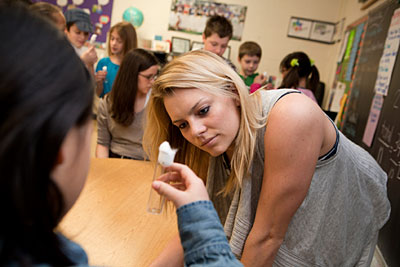Gymnast with epilepsy founds club and fruit fly lab to 'change the face of epilepsy'
By Susan S. Lang

After struggling with seizures, hospital stays and debilitating side effects -- including vomiting, severe dehydration, dizziness from taking multiple medications, migraines and memory loss -- Cornell varsity gymnast Kaitlin Hardy '12 confronted her epilepsy by co-founding FACES -- Facts, Advocacy and Control of Epileptic Seizures, with hockey player Dan Nicholls '11.
FACES aims to help those with epilepsy and their families cope with seizures, raise awareness about their social and psychological effects and combat the stigma surrounding seizures.
Diagnosed with a non-descript seizure disorder at 16, Hardy had her first grand mal seizure while at Cornell during a chemistry lab her sophomore year. "That first seizure was followed by about a half dozen more. With every seizure came an increase in the amount of medication I was taking until it got to the point where I was taking upwards of 30 pills a day," Hardy said.
While on medical leave for several months, Hardy said she slept 14-15 hours a day, hardly venturing out of bed. Then one day, she recalls, her grandfather said, "'You know kiddo, if you want to get your life back you're going to have to get up out of that bed and start living it.' That night I created FACES."
The organization started small, Hardy said, with an information session featuring a neurologist and a fundraising bar night. Now, the group has Cornell's only student-run lab in the history of the university, has written a children's book, and has pioneered mentoring and educational programs for Ithaca youth.
"There are lots of misconceptions about epilepsy," Hardy said. "Our mission is to attack epilepsy from all angles."
Eight students in the lab are researching the effects of seizure medication on "bang sensitive" mutant fruit flies. They decide their own research process and goals and "call their own shots," said Hardy, who presented the lab's work at a Society for Neuroscience conference last October -- the only undergraduate to do so alone.
Through outreach efforts, FACES members work to dispel the stigma associated with epilepsy and support those with the disorder. Members attend a local epilepsy support group and mentor youth with the disorder. As a varsity athlete, Hardy emphasizes that the disorder does not have to be an insurmountable obstacle to sports or other activities.
"It's given me a new sense of purpose. ... Despite everything, FACES has really helped me to channel all of my anger and frustrations into something positive," said Hardy, a neurobiology major in the College of Agriculture and Life Sciences who is in the process of applying to graduate school for neuroscience or global health.
FACES also seeks to educate the next generation about neuroscience and the world of scientific research. For example, on March 14 members visited Cayuga Heights Elementary School, where they showed students as young as 5 how to induce seizures in fruit flies and record the results.
In addition, FACES' children's book serves as a teaching tool with an empowering message: "We talk about epilepsy as a secret power because your brain works harder and faster than it's supposed to," Hardy said. She added that credit for FACES' success should also go to Nicholls; Kathy Berggren, senior lecturer of communication, who serves as the group's faculty adviser; Professors David Deitcher and Ron Hoy, who serve as lab advisers; and Professor Carl Hopkins.
"We are not stopping here," Berggren said. "The FACES team's next big vision is to become national, and eventually global, uniting with epilepsy societies throughout the world, extending our reach to no end."
Erica Rhodin '12 is a student writer intern for the Cornell Chronicle.
Media Contact
Get Cornell news delivered right to your inbox.
Subscribe